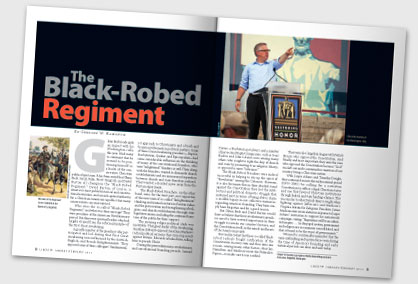The Black-Robed Regiment
Gregory W. Hamilton January/February 2011
Glenn Beck made quite an impact with his Washington rally this year. It led many to comment that he seemed to be positioning himself as a leader of the conservative Christian political spectrum. It has been noted that Glenn Beck, Sarah Palin, Newt Gingrich, and David Barton all champion the "Black-Robed Regiment." David Barton, of course, is America's most public historical and constitutional revisionist, and a much-quoted authority for a Christian American republic that many conservatives say once existed.
Who were the so-called "Black-Robed Regiment," and what was their message? They were preachers of the American Revolutionary period. But they were spiritual leaders who had largely strayed from the reform principles of the First Great Awakening.
A goodly number of the preachers who participated and led during that First Great Awakening were influenced by the Scottish, English, and French Enlightenments. They opposed some of their colleagues' fundamentalist approach to Christianity and a brash and brazen involvement in political matters. Some of these Great Awakening preachers—Baptist, Presbyterian, Quaker, and Episcopalian—had some considerable influence on the thinking of many of the constitutional founders, who were "enlightened" thinkers as well. They, along with the founders, wanted to dismantle church establishments and see an increased separation between church and state therefore realized. They wanted a decided move away from the Puritan experiment.
The Black-Robed Preachers, on the other hand, were, for the most part, not supportive of this new wave of so-called "Enlightenment" thinking and wanted a return to Puritan values and the preservation and strengthening of religious and church establishments through state legislative means, including the continued taxation of the public for their support.
The ensuing religio-political clash was inevitable. That great leader of the Awakening, Jonathan Edwards opposed Jonathan Mayhew's radical political sermons that stirred up revolt against Britain. Edwards rebuked him, telling him to preach Christ.
During the prerevolutionary, revolutionary, and constitutional founding periods, Samuel Davies, a Presbyterian stalwart, and a number of persecuted Baptist luminaries, such as Isaac Backus and John Leland, were among many others who sought to right the ship of church and state by promoting true religious liberty, as opposed to mere "tolerance."
The Black-Robed Preachers were indeed successful in helping to stir up the spirit of "Revolution" among the Colonists. However, it is also fortunate that in their decided stand against the Constitution they lost the intellectual and political domestic struggle that mattered most in terms of being able to claim a credible legacy in our collective memories regarding America's founding. They have simply been forgotten and for a good reason.
But Glenn Beck and David Barton would have us believe that these revolutionary preachers need to have revived importance in their struggle to rewrite our country's history, and the Constitution itself, in the minds and hearts of the American people.
Few realize today that these so-called black-robed radicals fought ratification of the Constitution in every state and thus were one reason, among many other factors, that Jay, Hamilton, and Madison wrote the Federalist Papers—to make sure it was ratified.
They were also largely in league with Patrick Henry, who opposed the Constitution. And finally, and most important, they were the ones who opposed the Constitution because "God" was left out and it contained no mention of our country being a Christian nation.
With Jasper Adams and Timothy Dwight, they continued on into the early national period (1800-1840) by calling for a rewritten Constitution to reflect a legal Christian status and one that favored Christian institutions through federal and state funding schemes. This was similar to what Patrick Henry sought when fighting against Jefferson's and Madison's Virginia Statute for Religious Freedom. James Madison even wrote a letter in response to Jasper Adams' invitation to support his nationwide campaign, stating: "Experience will be an admitted umpire. . . . In the papal system, government and religion are in a manner consolidated, and that is found to be the worst of governments."
We need to continually remember that the same unthinking and unwise forces seen during the time of America's founding and early national periods are alive and well today.
Article Author: Gregory W. Hamilton
Gregory W. Hamilton is President of the Northwest Religious Liberty Association (NRLA). Established in 1906, the Northwest Religious Liberty Association is a non-partisan government relations and legal mediation services program that champions religious freedom and human rights for all people and institutions of faith in the legislative, civic, academic, interfaith and corporate arenas in the states of Alaska, Idaho, Montana, Oregon and Washington. Mr. Hamilton wrote the seminal work, "Sandra Day O'Connor's Judicial Philosophy on the Role of Religion in Public Life," published in 1998 by Baylor University. From time to time, Greg publishes Liberty Express, a journal dedicated to special printed issues of interest on America's constitutional founding, church history and its developmental impact on today's church-state debates, and current constitutional and foreign policy trends. He is available to speak in North America and internationally about these subjects and related issues. To become familiar with the Northwest Religious Liberty Association, please visit www.nrla.com.